Articles by Helene Thiollet

Population and Development Review, 2024
Migrant destination states of the Global North generally seek to stem irregular migration while r... more Migrant destination states of the Global North generally seek to stem irregular migration while remaining committed to refugee rights. To do so, these states have increasingly sought to externalize migration control, implicating migrant origin and transit states in managing the movement of persons across borders. But do externalization policies actually have an impact on unauthorized migration flows? If yes, do those impacts vary across different migrant categories given that both asylum seekers and other migrants can cross borders without prior authorization? We argue that these policies do have an impact on unauthorized migration flows and that those impacts are distinct for refugees and other migrants. Using data on "irregular/illegal border crossings" collected by Frontex, the Border and Coast Guard Agency of the European Union (EU), we first find that the geographical trajectories of refugees and other migrants who cross EU borders without authorization are distinct. Using a novel method to estimate whether individuals are likely to obtain asylum in 31 European destination states, we find that "likely refugees" tend to be concentrated on a single, primary migratory route while "likely irregular migrants" may be dispersed across multiple routes. Through an event study analysis of the impact of the 2016 EU-Turkey Statement, a paradigmatic example of externalization, we show that the policy primarily blocked likely refugees while deflecting likely irregular migrants to alternative routes. Our findings ultimately highlight how externalization policies may fail to prevent unauthorized entries of irregular migrants while endangering refugee protection.
International Migration Review, 2024
Sudden rises in migration across the borders of the Global North have persistently attracted subs... more Sudden rises in migration across the borders of the Global North have persistently attracted substantial media attention and fueled hostility toward "irregular migrants" and "bogus refugees." While existing qualitative studies have extensively criticized the migrant-refugee distinction, we offer unique quantitative evidence of how migration numbers and labels construct impressions of increased irregular The first two authors share co-first authorship.

American Behavioral Scientist, 2023
Over the past decades, and across different contexts worldwide, migration has become inseparable ... more Over the past decades, and across different contexts worldwide, migration has become inseparable from a narrative of crisis. This article analyses the connection between migration and crisis. It proposes a migration as crisis framework, designed to understand and analyze the emergence of this specific perception of migration, on the basis of an interplay between social "subjective" constructions of reality and "objective" migration dynamics. Migration as crisis rests upon a fragmented, changing, and contested assemblage of events, representations, and practices, which in turn call for specific ways of governing migration. The link between migration and crisis can be activated or not, and may or may not be correlated with empirical realities. By engaging with migration as crisis (rather than migration crisis), the article denaturalizes and historicizes the relationship between migration and crisis, and unpacks the processes through which key actors (including media, policymakers, civil society, and academics) frame migration as such.

COGITO. Le magazine de la recherche, 2020
Labour economics classically predicts that wages are determined by supply and demand. Theoretical... more Labour economics classically predicts that wages are determined by supply and demand. Theoretically, if demand remains constant, emigration should increase wages in countries of origin (decreasing labour supply) and decrease wages in receiving countries (increasing labour supply). A malthusian vision of the economy also assumes that the arrival of new-comers in a market of limited jobs will leave some workers without employment or drive previously employed ones out of their jobs. The view that immigration decreases natives’ wages and generates unemployment are widely held. An alternative theory suggests that immigrants also consume in the destination country, hence increasing local demand, and/or that local production expands, now that additional labor is available. We need to try and empirically distinguish the competing theories from each other. We also need to examine if this is what is happening on empirical grounds at local levels? //
Traditionnellement, l’économie du travail postule que les salaires sont déterminés par l’offre et la demande. Selon cette théorie, à demande constante, l’émigration doit se traduire par une augmentation des salaires dans les pays d’origine (diminution de l’offre de main-d’œuvre). Elle doit aussi entraîner une diminution des salaires dans les pays d’accueil (augmentation de l’offre de main-d’œuvre). Une vision malthusienne de l’économie part également du principe que l’arrivée de main d’œuvre sur un marché de l’emploi contraint laisse certains travailleurs sans emploi ou chasse de leur emploi ceux qui en avaient un. L’opinion selon laquelle l’immigration fait diminuer les salaires des autochtones et génère du chômage est largement répandue.
Cependant une théorie concurrente suggère que les immigrants, consommant dans leur pays de destination, donnent lieu à une augmentation de la demande locale, et/ou que la production locale se développe grâce à cette main-d’œuvre supplémentaire.
Pour départager ces approches, on peut examiner ce que nous disent les données empiriques sur ce qui se passe à des échelles locales.
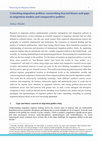
Research in migration politics predominantly examines immigration and integration policies in Wes... more Research in migration politics predominantly examines immigration and integration policies in Western democracies, at best widening its scientific enquiries to migration corridors that are often defined by colonial history. Just like any social science field, empirical ethnocentrism mirrors the geography of scientific employment and institutions, the economics of research funding and the politics of academic publications. Apart from raising ethical issues, these limitations constrain our understanding of processes and dynamics of international migration politics, firstly, by neglecting empirical realities that are statistically relevant – notably migration politics in the Global South – and secondly, by creating methodological and epistemological biases. Documenting less-researched cases offers an obvious remedy to the problem. Yet the future of research on migration politics is not only about more research on “non-Western others” that boxes the results in “area studies” or a “compa...
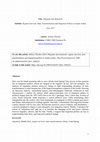
Third World Quarterly, 2021
How was the Saudi monarchy able to stave off the Arab Spring? One answer to this question lies in... more How was the Saudi monarchy able to stave off the Arab Spring? One answer to this question lies in migration politics, which are integral to the regime's ad hoc survival strategies. An analysis of migration politics, moreover, brings to light longstanding dynamics of state transformation in what remains one of the largest immigration countries in the world. Drawing on discourse analysis, institutional history, and ethnographic fieldwork conducted in state bureaucracies, I explore the critical, albeit under-researched, role of migration politics in political change from the 1991 Gulf crisis to the 2011 uprisings. First, I show that, in times of crisis, Saudi monarchs made migration a central political issue: while maintaining mass immigration into the country, they used immigrants as scapegoats to deflect popular grievances and further individual power-seeking agendas. Secondly, I demonstrate that migration became a policy domain with its own rules, bureaucratic practices, power relations, and rationalitiesa process designed to impose a state monopoly over migration control. Thirdly, I introduce the notion of "migration rent" and use it to describe the changing social and power relations between migrants, citizens, and the state. Finally, I suggest that migration politics are key to understanding both short-and long-term political change.

Chroniques yéménites, 2016
The notion of “transnationalism” emerged in the 1970s, in the field of international relations, t... more The notion of “transnationalism” emerged in the 1970s, in the field of international relations, to describe the modalities of non-state actions — and their spatialities — within the framework of “world politics.” The point was to break with the state-centred perspective of political developments to include non-state actors in a complex political game that no longer takes place exclusively within the legal and physical borders of nation-states. Thus, new approaches to transnational relations began to explore, within and beyond the state, the processes, networks and practices of multiple social actors that unfold according to specific modalities and scales: businesses, diasporas, religious communities, scientific or cultural networks, trade unions, social movements (including global protest movements), non-governmental organisations, etc. Gradually, and in a diffuse way, the concept came to not only refer to the individual and collective practices and strategies of persons, consumers, migrants, and professionals of a given field, but also to the culture of formal or informal institutions that operate transnationally.
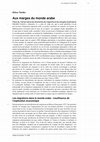
Chroniques yéménites, 2004
Pace du Yémen dans les itinéraires de migrants et de refugiés érythréens PHILIPPE FARGUE a démont... more Pace du Yémen dans les itinéraires de migrants et de refugiés érythréens PHILIPPE FARGUE a démontré, il y a plus de vingt ans, que la rente pétrolière n'avait pas favorisé l'intégration régionale arabe et qu'elle constituait au contraire, un facteur de différenciation croissante entre les pays de la région 1. Les quelques études disponibles sur le sujet dans le monde arabe constatent l'échec du processus d'intégration initié à la fin de la seconde guerre mondiale, au moment de l'indépendance, et poursuivi, au cours de l'essor de l'économie pétrolière, dans le Golfe et la péninsule Arabique 2. Les flux migratoires dans le monde arabe ont constitué un des seuls domaines d'intégration effective dans cette région du monde jusque dans les années 1990. Réfugiés palestiniens et travailleurs égyptiens sont les deux groupes de migrants ayant particulièrement bénéficié de l'intégration de la région « monde arabe » : les premiers sur des critères politiques, les seconds, par l'organisation d'un marché du travail intégré. Au-delà de ces cas d'école, la dynamique régionaliste a offert, aux marges géographiques et culturelles de cette zone, des opportunités politiques et économiques à la population érythréenne. À l'instar de Palestiniens, celle-ci a bénéficié de politiques d'asile dans certains pays arabes tout au long de la guerre d'indépendance qui a opposé la province érythréenne à l'Éthiopie de 1961 à 1991. Les Érythréens ont pu s'intégrer à des flux migratoires de proximité, construits autour des pôles d'attraction que représentent les pays producteurs de pétrole.
Raisons politiques, 2005
HAL is a multidisciplinary open access archive for the deposit and dissemination of scientific re... more HAL is a multidisciplinary open access archive for the deposit and dissemination of scientific research documents, whether they are published or not. The documents may come from teaching and research institutions in France or abroad, or from public or private research centers. L'archive ouverte pluridisciplinaire HAL, est destinée au dépôt et à la diffusion de documents scientifiques de niveau recherche, publiés ou non, émanant des établissements d'enseignement et de recherche français ou étrangers, des laboratoires publics ou privés. L'invention de la contestation transnationale par les forums et sommets : la naissance d'un " espace public mondial " ?
Critique internationale, 2012

International Labor and Working-Class History, 2011
This article explores the political dynamics of labor migration in the Middle East. It seeks to e... more This article explores the political dynamics of labor migration in the Middle East. It seeks to explain the politics of Arab population movements by looking at historical trends in regional integration and contends that migration to the oil-rich countries, including refugee flows, has been the key factor driving Arab integration in the absence of effective institutions and economic integration processes. To account for the influence of this largely forgotten factor, the article looks at the formal and informal institutions that have shaped massive labor flows from the 1970s onward. It offers historical evidence pointing to the role of migration in Arab regional integration by looking at free circulation of Eritrean refugees and migrants in the Arab region using oral history and administrative archives. Linking labor migration, refugee movements, and regional politics, the article introduces the concept of “migration diplomacy” as an analytical framework and argues that the politics ...
Revue européenne des migrations internationales, 2015
Je remercie Nicholas van Hear et Oliver Bakewell pour leurs commentaires à la suite d'une interve... more Je remercie Nicholas van Hear et Oliver Bakewell pour leurs commentaires à la suite d'une intervention au séminaire COMPAS « Shifting powers, shifting mobilities » (Oxford, 5 mars 2015). Je remercie aussi chaleureusement Delphine Pagès-El Karoui co-éditrice de ce dossier thématique pour ses relectures et ses commentaires.
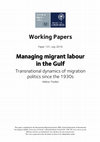
This paper looks at migration management in the Gulf monarchies since the 1930s. It describes the... more This paper looks at migration management in the Gulf monarchies since the 1930s. It describes the dynamics of labour import and immigration policies highlighting the hybrid nature of migration management. Migration trends and migrants’ lives are organised by public and private actors and institutions operating transnationally, between home and host countries. The economic determinants and the exploitative dimension of migration management have often been highlighted in the literature. This paper explores the patterns and politics of migration management at the domestic, regional and international level over time to identify changes and continuity. From the colonial premises to the 1970s and the oil boom, the patterns of labour import management proved consistent, shaping immigration as temporary and denying foreign workers socio-economic rights. The politics and the economics of migration management evolved over time, accounting for instance for a shift in the geography of labour im...

Chapter 3 (p.50-80) in Understanding Global Migration, edited by James Hollifield and Neil Foley, 50–80. Stanford, Calif: Stanford University Press, 2022
This chapter offers an overview of Gulf migration systems from the early 20 th century to today. ... more This chapter offers an overview of Gulf migration systems from the early 20 th century to today. Mobility, motivated by trade, labor, politics or religious devotion, whether permanent or temporary, has been central to the region's history. The first section of the chapter describes the changing geographies of immigration to the Gulf through three historical sequences. Gulf migration systems evolved from imperial geographies of colonial migration within the British Empire (1930s-1950s) to Arab regional integration during and after the oil-boom era (1960s-1991). In the 1990s and after, diplomatic interdependence with the Asian Global South unfolded in the context of the diversification of Gulf economies and the "second migration boom" of the 2000s took place. The second part of the chapter focuses on the contemporary era and unpacks the dynamics of migration governance in Gulf countries today. It describes the role of states, markets, brokers and migrants in migration governance and illustrates the emergence of illiberal migration states, as a counter model to liberal migration states in Western contexts (Hollifield 2004).
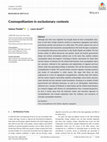
Population Space and Place, 2020
Although over time mass migration has brought about de facto cosmopolitan situations in Gulf citi... more Although over time mass migration has brought about de facto cosmopolitan situations in Gulf cities, foreign residents continue to experience segregation and endure exclusionary policies and practices on a daily basis. This article unpacks two sets of internal tensions that characterise cosmopolitanism in the Gulf, through a comparison of cosmopolitan discourses and practices in Abu Dhabi, Riyadh and Jeddah. The first tension relates to official discourses and policies: Saudi and Emirati governments design and enforce exclusionary policies and, at the same time, publicly endorse cosmopolitan ideals and projects—consisting in Islamic universalism for Saudi cities and the rhetoric of tolerance for the United Arab Emirates. Such cosmopolitan claims are, moreover, reflected in the aspirations and subjectivities of migrants and local citizens while also generating feelings of alienation. We call this discursive paradox cosmopolitanism in denial. The second tension concerns migrants' everyday practices and modes of consumption in urban spaces. We argue that these are best understood as a form of segregated cosmopolitanism, whereby both Gulf citizens and the various migrant communities explicitly acknowledge, and at times consume, urban diversity but also maintain certain boundaries. Drawing on an analysis of both governmental and individual discourses, as well as on ethnographic observations collected over a decade of fieldwork in Saudi Arabia and the United Arab Emirates, our research engages with theories of cosmopolitanism from a situated perspective. As such, it moves away from the dominant unitary and normative approach to cosmopolitanism and instead emphasises both the resilience and transience of everyday cosmopolitan situations.
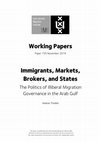
Despite seemingly open immigration policies and rights-based reforms, the six Gulf Cooperation Co... more Despite seemingly open immigration policies and rights-based reforms, the six Gulf Cooperation Council (GCC) countries recently engaged in international and domestic policies to better control immigration. This article unpacks the realpolitik of mass immigration conducted by the Gulf states by showing how they use retaliatory and coercive migration diplomacies as well as migrant rightswashing on the international scene to shape immigration flows. At the domestic level, Gulf governments’ reforms seek to police labour market segmentation and institutionalise a regime of “differential exclusion” that officialises intersectional discriminations across nationalities and class. Drawing upon sources in English and Arabic, as well as interviews with public officials, businessmen, and migrants in the region over a decade (2006-2017), this article describes how states and nonstate actors, including businessmen, migrant networks, and brokers, operate policies and practices of control. I first ...
Cette video presente la cinquieme seance du seminaire doctoral du projet ANR LIMINAL - Linguistic... more Cette video presente la cinquieme seance du seminaire doctoral du projet ANR LIMINAL - Linguistic and Intercultural Mediations in a context of International Migrations (CESSMA / CERLOM / PLIDAM, Inalco). Cette seance coordonnee par Helene Thiollet (CERI-Sciences Po) est consacree au theme des migrations en Afghanistan. Deux specialistes du sujet sont intervenus lors de ce seminaire : - Liza Schuster (University of London): "Politique migratoire en Afghanistan". - Belgheis Alavi Jafari (Afghanistan Center at Kabul University): "Parcours des familles afghanes et representations de la migration".
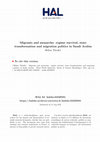
Third World Quarterly, 2021
How was the Saudi monarchy able to stave off the Arab Spring? One answer to this question lies in... more How was the Saudi monarchy able to stave off the Arab Spring? One answer to this question lies in migration politics, which are integral to the regime's ad hoc survival strategies. An analysis of migration politics, moreover, brings to light longstanding dynamics of state transformation in what remains one of the largest immigration countries in the world. Drawing on discourse analysis, institutional history, and ethnographic fieldwork conducted in state bureaucracies, I explore the critical, albeit under-researched, role of migration politics in political change from the 1991 Gulf crisis to the 2011 uprisings. First, I show that, in times of crisis, Saudi monarchs made migration a central political issue: while maintaining mass immigration into the country, they used immigrants as scapegoats to deflect popular grievances and further individual power-seeking agendas. Secondly, I demonstrate that migration became a policy domain with its own rules, bureaucratic practices, power relations, and rationalities –a process designed to impose a state monopoly over migration control. Thirdly, I introduce the notion of "migration rent" and use it to describe the changing social and power relations between migrants, citizens, and the state. Finally, I suggest that migration politics are key to understanding both short- and long-term political change.









Uploads
Articles by Helene Thiollet
Traditionnellement, l’économie du travail postule que les salaires sont déterminés par l’offre et la demande. Selon cette théorie, à demande constante, l’émigration doit se traduire par une augmentation des salaires dans les pays d’origine (diminution de l’offre de main-d’œuvre). Elle doit aussi entraîner une diminution des salaires dans les pays d’accueil (augmentation de l’offre de main-d’œuvre). Une vision malthusienne de l’économie part également du principe que l’arrivée de main d’œuvre sur un marché de l’emploi contraint laisse certains travailleurs sans emploi ou chasse de leur emploi ceux qui en avaient un. L’opinion selon laquelle l’immigration fait diminuer les salaires des autochtones et génère du chômage est largement répandue.
Cependant une théorie concurrente suggère que les immigrants, consommant dans leur pays de destination, donnent lieu à une augmentation de la demande locale, et/ou que la production locale se développe grâce à cette main-d’œuvre supplémentaire.
Pour départager ces approches, on peut examiner ce que nous disent les données empiriques sur ce qui se passe à des échelles locales.
Traditionnellement, l’économie du travail postule que les salaires sont déterminés par l’offre et la demande. Selon cette théorie, à demande constante, l’émigration doit se traduire par une augmentation des salaires dans les pays d’origine (diminution de l’offre de main-d’œuvre). Elle doit aussi entraîner une diminution des salaires dans les pays d’accueil (augmentation de l’offre de main-d’œuvre). Une vision malthusienne de l’économie part également du principe que l’arrivée de main d’œuvre sur un marché de l’emploi contraint laisse certains travailleurs sans emploi ou chasse de leur emploi ceux qui en avaient un. L’opinion selon laquelle l’immigration fait diminuer les salaires des autochtones et génère du chômage est largement répandue.
Cependant une théorie concurrente suggère que les immigrants, consommant dans leur pays de destination, donnent lieu à une augmentation de la demande locale, et/ou que la production locale se développe grâce à cette main-d’œuvre supplémentaire.
Pour départager ces approches, on peut examiner ce que nous disent les données empiriques sur ce qui se passe à des échelles locales.
This erudite Research Handbook features a systematic review of the analytical framework of global migration governance. Chapters identify and explain key institutions involved in global migration, focusing on changes in patterns and actor behaviours. Key actors explored in the Research Handbook include international organisations, migrant networks, civil society groups, smuggling cartels, religious transnational organisations, security firms and trade unions. Ultimately, it aims to contribute to a renewed understanding of migration drivers and proceedings.
Students and advanced scholars of international relations and politics studying topics such as migration policy will find this thorough Research Handbook to be incredibly valuable. Experts and agents of international and non-government organisations will additionally find it to be beneficial.
This open access book bridges the gap between normative and empirical approaches to cosmopolitanism at the local scale
Provides insight on the connection between cosmopolitanism and urbanity in cities
Looks at migrants and mobile people as crucial actors in processes of urban changes
La crise qui touche l’Europe depuis 2015 a radicalisé les positions politiques et les discours sur les migrations, l’asile et l’immigration…
Pour ne plus se contenter des idées reçues, les auteurs dissipent les malentendus et répondent aux 50 questions essentielles.
http://www.armand-colin.com/migrants-migrations-50-questions-pour-vous-faire-votre-opinion-9782200616199
Lectures 1 to 5 introduce and examine the main concepts at stake and historical trends in World Politics.
Lectures 6 to 12 delve into various topics and issues in contemporary World Politics.
The course’s syllabus, assignments guidelines, weekly slides and readings are available on the course’s Moodle website: https://moodle.sciences-po.fr/course/view.php?id=2327